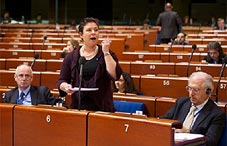Council of Europe votes on new resolution
By Ana Robakidze
Thursday, January 24


The resolution is based on a report prepared Tina Acketoft (Sweden, The Alliance of Liberals and Democrats for Europe) (ALDE), which says that urgent humanitarian problems have already been dealt with. However, long term humanitarian challenges, such as the return of internally displaced people and providing housing for them still requires an urgent solution.
“With the exception of the limited return of internally displaced persons (IDPs) to the Gali and Akhalgori areas, the prospects for the return of displaced persons are dim. As a result, durable housing solutions and the provision of livelihoods for displaced persons will be a continuing challenge for Georgian authorities,” the document reads.
According the report, the current security situation in the conflict regions does not seem to be improving, though it is less tense than it was in 2008 when it led to war. Security can be ensured only by the presence of strong non-partisan international peacekeeping or a monitoring group across both sides of the administrative boundary line.
The report also gave recommendations to the Committee of Ministers, which should help to settle the situation in the conflict regions. “The first is to use the Council of Europe’s educational expertise to guarantee mother tongue education, in particular for those with Georgian mother tongue in the area of Gali. The second is to provide assistance for the successful integration of resettled IDPs. The third is to offer assistance in combating domestic violence which has been aggravated as a consequence of the war. Finally, greater freedom of movement should be encouraged across the administrative boundary line.”
Before presenting the draft resolution for voting, it was discussed by the migration committee of the parliamentary assembly. Georgian representatives participating in the committee work presented their own remarks.
It is worth mentioning that the new draft resolution repeats the phrases “Abkhazia-Georgia” and “South Ossetia-Georgia” and as well as term “occupied”.
The final text of the resolution was accepted after the debates which took place in Strasburg. The Georgian side had its own demands regarding the final document. Georgian representatives requested putting corresponding paragraphs in the resolution, directly recognizing Abkhazia and South Ossetia as occupied territories. The Georgian side also requested that the resolution obligate Russian troops to leave the occupied territories; as well as a neutral observer mission to be deployed in the conflict regions.
Georgian representatives were satisfied with the final resolution. PM Tina Khidesheli from the Georgian Dream coalition, said that the Georgian side had presented 21 amendments and many of those were accepted and depicted in the final text, which she finds to be a very positive fact, leading to adopting an acceptable resolution for the country.
Representative of the United National Movement (UNM), MP Davit Bakradze, also confirmed with journalists that the final resolution is totally acceptable for the Georgian side.
One of the key issues for Georgia was to make sure the term “occupation” is used in the resolution, which has been achieved. The final text adopted assures the IDPs’ right to return to their homes and also requests that the monitoring mission is spread all over Georgian territory including in the occupied regions. The document directly requests from Russia the fulfillment of the cease-fire agreement.
